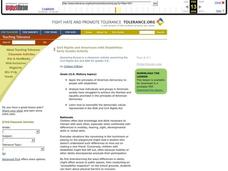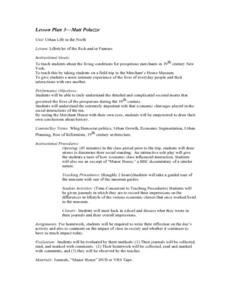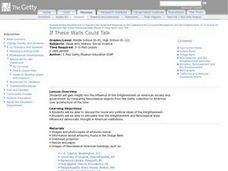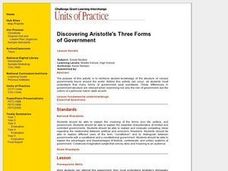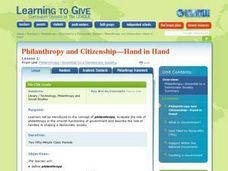Curated OER
Civil Rights and Americans with Disabilities
Students apply the principles of American democracy to people with disabilities. They analyze how individuals and groups in American society have struggled to achieve the liberties and equality promised in the principles of American...
Curated OER
Lifestyles of the Rich and/or Famous
Students explore and analyze the detailed, yet complicated profiles that society placed on the lives of the prosperous as well as those with economic disadvantages in 19th century New York. In addition, by seeing the Merchant House...
Curated OER
Due Process of Law and the Jim Crow Era
Students analyze eight case studies of Supreme Court decisions regarding due process of law and their impact on American society in the early 20th century. They digest that although the 14th amendment was intended to give federal rights...
Curated OER
What I Dream For:
Students investigate about the life and work of Martin Luther King Jr., watching video clips from unitedstreaming. They identify ways that they can help make Martin Luther's dream of peace a reality. Pupils identify contributions that...
Curated OER
Ancient Democracy
Students describe which segments of society were included in the original Athenian democracy. They compare and contrast early Greek democracy to democracy as it is exercised in the United States today.
Curated OER
If These Walls Could Talk
Students investigate the influence of the Enlightenment on American society and government. For this Enlightenment lesson, students work cooperatively in groups to define the principles of the Enlightenment, American...
Curated OER
Helping Ourselves: Why Philanthropy Works
Students discover the concept of philanthropy. In this civics lesson, students investigate the role of philanthropy in our society, and how it makes life better for all.
Curated OER
Discovering Aristotle's Three Forms
Students, working in small groups, role play different kinds of governments--oligarchy, monarchy, dictatorship, and democratic republic. They portray their form of government in a skit, while other groups guess which kind of government...
Curated OER
Power of the People
Students determine the meaning of democracy and investigate accomplishments of a number of United States presidents. They look at images of the presidential one dollar coins before they determine how the job of the president differs from...
Curated OER
COMMUNITY JUSTICE
Students investigate the place of citizens in a society. They also research the way a court system works in conjunction with law enforcement. Students apply his/her understanding and knowledge of the law enforcement and court system when...
Curated OER
The Need for Government—A Cinematic and Literary Perspective
Students examine the philosophy of government. In this types of government lesson, students explore literature and movie clips to determine the value of rules in lawless societies.
Curated OER
Jerry Rubin, Abbie Hoffman, and the 60s Counterculture
Students identify how American society responded to the 1960's counterculture. In this 1960's America lesson plan, students investigate multimedia sources in order to examine the movement and its impact on the country.
Benjamin Franklin Tercentenary
Classroom Constitutional Convention
Students investigate the eight phrases that comprise the Preamble to the U.S. Constitution to determine its principles and purpose. Their own Constitutional Convention is convened to craft a preamble for their school's governance.
Curated OER
CDV, CDV, What's a CDV?
Introduce your class to the Core Democratic Values. The lesson focuses on defining the Core Democratic Values and related terms. Small groups look up terms and present a song based on the information they've found. After the...
Curated OER
World History Fair and Exposition
Students role-play as invitees to the World's Fair to develop a virtual electronic pavilion or poster presentation about the United States, its history and challenges. They act as tour guides giving their presentations and answering...
Curated OER
Philanthropy and Citizenship-Hand in Hand
High schoolers define philanthropy and evaluate how the government would functin without the help of volunteers. They write song lyrics, participate in a class discussion, and complete a Venn diagram.
Curated OER
Power to the People
Students work together to research leaders of disadvantaged groups. They identify how these people use the nonprofit sector to make positive changes. They discuss how the leader uses the democratic core values and present the information...
Curated OER
What does it mean to be a citizen?
Students examine democracy and the role of a citizen. They contrast rights and responsibilities of individuals, groups, and organizations. Students identify two forms of democratic action and describe demoncratic values. Students observe...
Curated OER
Active Citizenship through the Spectacles of Benjamin Franklin
Students research and identify ways that Benjamin Franklin contributed to society. They identify the core democratic values and how he achieved them. They research organizations in their area that give back to the community.
Curated OER
Prejudice and Discrimination
Students are read-aloud an excerpt from The Friendship by Mildred Taylor. They pick strips of paper, white or brown, and sit according to color drawn. Students are given preferential treatment if their paper is white while the students...
Curated OER
Canada Belongs to Us All
Tenth graders have the opportunity to meet with people in their own school who have not lived in Canada their entire lives. They describe fundamental beliefs and values associated with democratic citizenship.
Curated OER
When in Greece, Do as the Greeks Do
Students examine the contributions of ancient Greeks in this five lesson unit. The explorations reveal how Greece shaped our stories, our modern language, and our society. The study of the Greek myth forms the basis of this unit.
Curated OER
Understanding the Importance of the Declaration of Independence
Eighth graders examine the importance of the Declaration of Independence
by using a variety of research sources and computer technology to obtain information. They internalize the thoughts, actions, and motives of the signers of the...
Curated OER
Meeting in a Fishbowl: Consensus vs. Democracy
Students analyze the democratic and consensual decision-making process. They review the distinctions between decision-making and consensus and simulate a town meeting and a tribal meeting. They select an issue and research the issue from...


